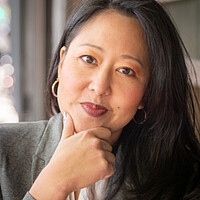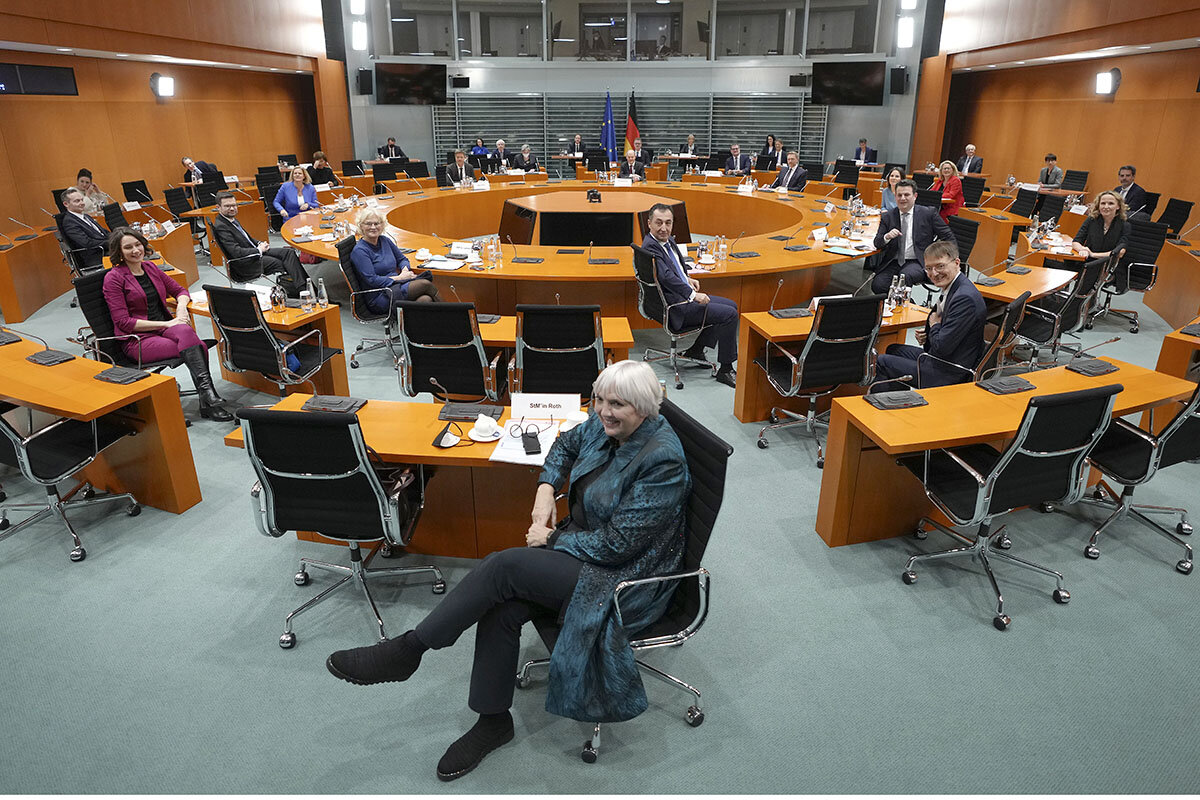Gender parity in Germany: How much did Merkel pave the way?
Loading...
| Berlin
Angela Merkel, the former German chancellor, refused to call herself a feminist. But after stepping down last year following 16 years in power, it’s now clear her strongest legacy might be the path she’s paved for other women.
Chancellor Olaf Scholz has appointed eight women to his Cabinet, including the key positions of foreign affairs, security, and defense in Europe’s powerhouse economy. That makes the gender balance in his cabinet exactly 50-50.
“We’re sure it’s the right thing to do ... that represents the society in which we live, in which men and women each make up half of the population and in which it should be normal that women have half the power,” Mr. Scholz said in a press conference last month announcing the picks.
Why We Wrote This
Labels, both good and bad, often mean little. That’s why Angela Merkel’s refusal to call herself a feminist hasn’t gotten in the way of women rising to power in today’s Germany.
There’s much to be done, such as narrowing the gender pay gap, providing paternity leave, and boosting more women into STEM fields. But many experts view gender parity in the Cabinet as an important first step toward progress for Germany, which has lagged on many of the traditional metrics.
“It’s definitely a strong sign on a symbolic level. Already under Ms. Merkel, women in political leadership appeared more and more frequently, even in right-wing parties,” says Annette Henninger, a politics and gender relations professor at Philipps University of Marburg. “Now it seems that gender stereotypes are really starting to change.”
On the rise
Ms. Merkel has long been a rare female leader in the conservative ���Ǵ��� Democratic Union (CDU). And, while her ascendance to German chancellor was hailed around the world – during President Donald Trump’s tenure she was oft-referred to as the last defender of liberal democracy – women at home found limited success under her helm.
As chancellor, Ms. Merkel did appoint Germany’s first and second female defense ministers, Ursula von der Leyen and Annegret Kramp-Karrenbauer. But Ms. Kramp-Karrenbauer struggled to consolidate power within her political party and later stepped down from political life. Annalena Baerbock’s rousing ascendance as a Green Party candidate for chancellor lasted only weeks, and she was roundly attacked online and in the media. The treatment, experts said, was rooted in .����
Ms. Merkel herself never proclaimed a strong position on women’s rights, perhaps because she couldn’t in a male-dominated political world. She had spoken out for the need to put more women on Germany’s corporate boards, but within the CDU she had to tread carefully.
“She certainly has experienced enough misogyny in her time – back in the 90s the CDU was full of terrible men,” says Ursula Münch, political scientist and current director of the independent think tank Academy for Political Education in Bavaria.
“Female empowerment was never something Merkel did openly,” she says. “She didn’t consciously play that card because she knows that with this card, you can only win over those who are already on your side.”
In Berlin in 2017, when Ms. Merkel was asked whether she is a feminist, she responded with a bland non-answer: “To be honest, the history of feminism is one with which I have common ground but also differences, and I don’t want to embellish myself with a title I don’t have.”
Indeed, the reality for women in Germany has been remarkably unprogressive. In Parliament, women hold only 35% of seats, while only three of Germany’s 16 states are led by women. In Germany’s corporate sector, men dominate, with more than 600 male executives to only 93 women serving on the boards of companies making up Germany’s main stock market indexes, according to the AllBright Foundation.
Women are paid on average 80% of what men make in Germany, marking one of the highest gender pay gaps among European Union member states. Germany’s criminal code also makes abortion – both for the woman seeking one and the practitioner performing the procedure – technically punishable by fines or prison time. Another section prohibits advertising for abortions.
Working mothers also need easier access to child care, and income needs to increase in professions dominated by women, such as nursing, says Dr. Henninger. Women’s shelters also need more resources.
Changing minds
In other words, there’s plenty of work to do. Yet, hopes are high that Germany’s first gender-equal Cabinet will mark a new chapter.
For starters, as Chancellor Scholz has said, “Security will lie in the hands of strong women in this government.”
The Cabinet members in charge of security have already touted a harder line than their predecessors. The foreign minister, Ms. Baerbock, wants Germany to take a tough stance in addressing Russia’s regional, and China’s global, ambitions. The interior minister, Nancy Faeser, has promised to fight far-right extremism and threats to Germany’s liberal democracy. Christine Lambrecht, who will oversee defense, has vowed to properly fund Germany’s military, which has for years been under-resourced.
And there’s talk that attention will finally be paid to advancing women-friendly policies. Agenda 2030, a package of sustainable development goals that include gender equality, contains milestones such as reducing the gender pay gap, encouraging more girls to enter STEM fields, and boosting the percentage of women on companies’ supervisory boards to 30%.
“We expect that all departments will take responsibility and actively develop the government’s equality strategy,” says Elke Ferner, chairwoman of U.N. Women Germany.
Today women with small children are now in leading government positions, which represents a sea change from the time when people speculated about former Defense Minister and current European Commission President Ms. von der Leyen’s child care arrangements. (She has seven children.) “Now, the question of ‘Can she really do that?’ is not being asked anymore,” says Dr. Henninger.
“Women in Germany have gotten stronger over the past years. They have organized themselves across all sectors and age groups and found their voice,” says Jutta Allmendinger, a gender inequality expert and president of the research institute WZB Berlin Social Science Center. “I think Olaf Scholz really had no other choice.”
As the first woman at the head of the government, Ms. Merkel set a standard that Germany now must build upon, says Ms. Ferner of U.N. Women Germany. “Now it’s about changing basic conditions so that equal participation for women is possible in all areas.”






